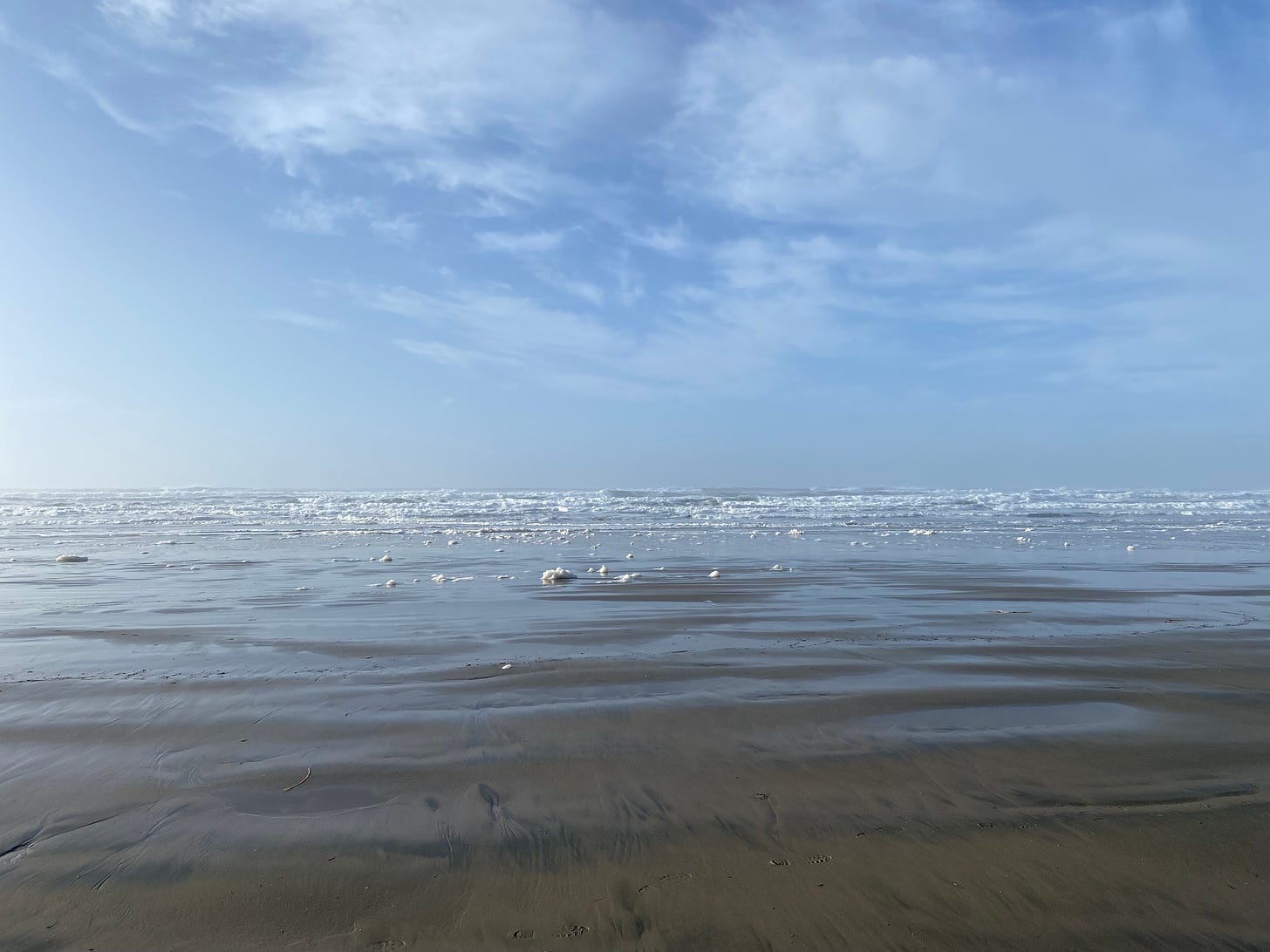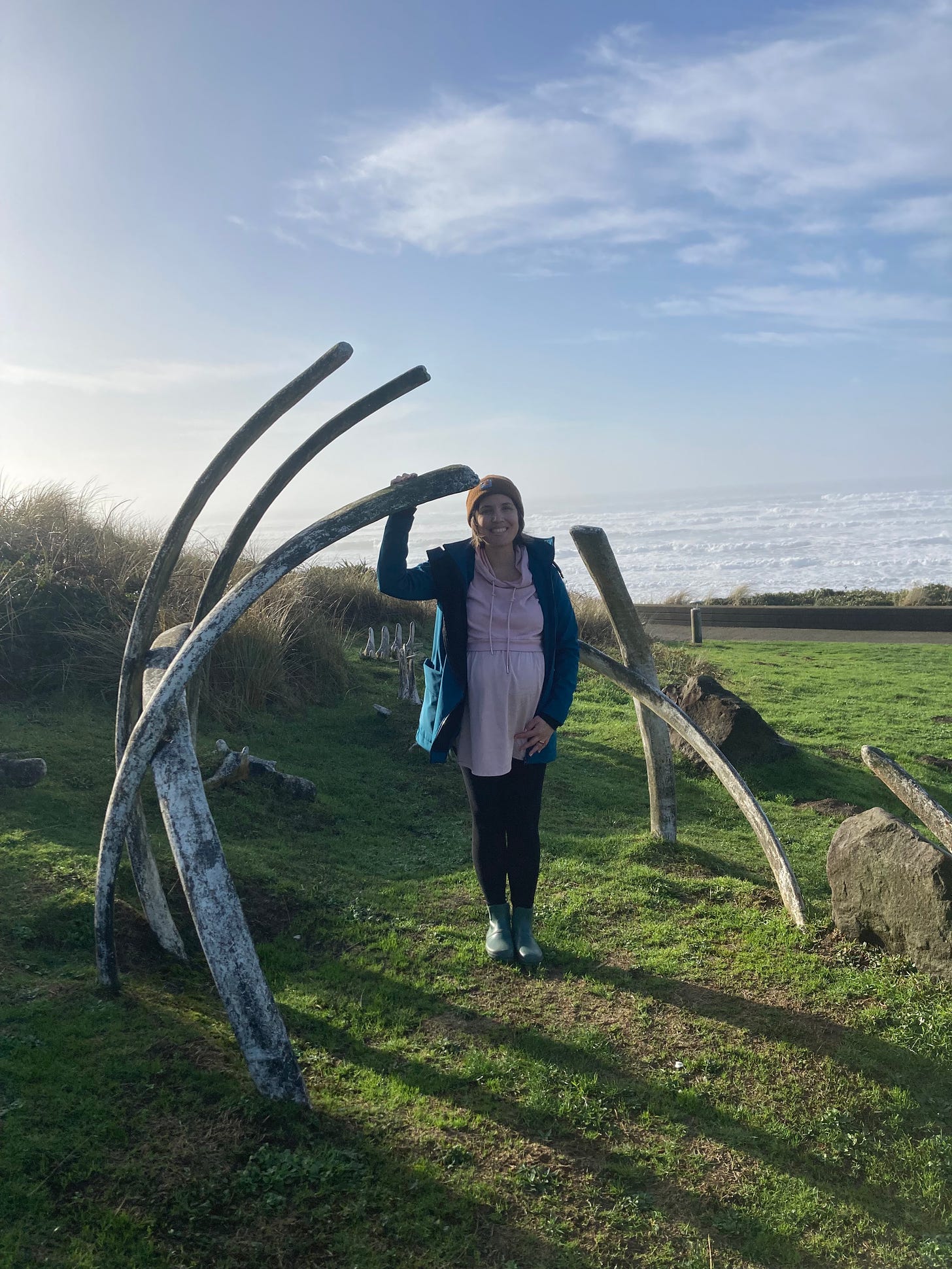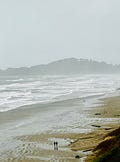
I'm sitting in an uppermost alcove of the Sylvia Beach Hotel, watching wave after wave move toward the rain-battered beach. Sea and sky are the same shade of gray. Each wave tosses and folds itself into the next, foam and spray turning the whole expanse into a sheet of white. I'm thinking about how long the ocean has been telling this story, both the calm of low tide and the high drama I'm witnessing now, the tide pulled right to the bluffs' edge.
I'm here to celebrate turning 40, spending a weekend with three close girlfriends, all of us readers and writers and mothers. Each of us is tucked into a cozy corner of this rambling hundred-year-old building, with books and tea and writing projects, looking forward to a day spent navigating the creative tides together. It's a gift of this place and of longtime friendship, being able to slip into solitude for the morning and the afternoon, and come together in between for meals and conversation and walking the beach.
I've brought two books with me, and the sliver of an idea, something I want to write about what I learned in my thirties, inspired by this beautiful post from a year ago. I'm thinking about waves and stories and history, and a tale I heard somewhere about the timbers of the hotel being salvaged from a shipwreck that washed ashore at the turn of the last century.
I'd planned to write a list of short lessons, but instead I find myself thinking about one lesson in particular: how I became a mother in my thirties, and how it began as a struggle.
In the beginning, I resisted. Then, I experienced two early miscarriages, and intense longing. And then, for most of my thirties, I fought against what I thought of as being swallowed by motherhood. Slowly, that story has changed. It has become more about not resisting being swallowed, but instead letting myself be changed by the experience, a Jonah tossed up on a new shore. It's the same shore of my own life, but somehow, I am new. I'm not the same person I was at thirty. Today I'm 40, blinking back the salt water and looking around, amazed.
I begin this new decade about to become a mother of four; I began the last decade wondering if I'd have even one child. I had thought God cruel for allowing me to experience loss, and now I give thanks for the way God held me in love, blessing me with His presence even when all I saw was His absence.
James Martin, SJ, in The Jesuit Guide to (Almost) Everything, writes about a story he was told by the superior of the Society of Jesus, in which a monk asks an abbot if he'd ever seen God face to face. The abbot said no, but that even Moses never saw God in this way: “You cannot see my face; for no one shall see me and live.” (Exodus 33:19-20) Instead, Moses saw God's back as he passed by.
This matches the sense I have of my own experiences of God: it is in looking back that I can see God at work. I can see how God blessed me through those experiences of loss and longing for motherhood. Among other gifts, those experiences gave me the fuel I needed to propel myself into this role I'd feared for so long. The sharpening of this desire-- or maybe its revelation, buried deep inside-- helped me to finally let go of limiting beliefs about my purpose in life, what I need to be happy, and what real freedom is. Paradoxically, the thing I feared because of what it might take from me has become the landscape where God has blessed me most, where I am surprised to “find” God everywhere I look.
The superior goes on to tell Fr Martin, in the story about the monk and the abbot, that “...it is less a matter of searching for God than of allowing oneself to be found by Him in all of life's situations, where He does not cease to pass and where He allows Himself to be recognized once He has really passed.”

It took the long decade of my thirties to become open to gratitude for this grace, this chance to recognize God's presence with me at every turn. To see that the mystery of suffering and the mystery of God's perfect Love exist side by side. The one does not negate the other.
I'm looking back at the last decade and thinking about the ways in which I tried to flee from God, wanting to hide from Him, not wanting to accept His plan for my life or let myself be shaped by God through the experiences He gave me. I remember so clearly telling my pastor, after our first loss, that I felt imprisoned by Jesus. I believed and trusted in the Lord's goodness; I could not do otherwise. And yet I also couldn't reconcile the pain I was feeling with my understanding of goodness.
Then and at many other points in my journey through early motherhood, I was angry at my circumstances, and I wanted to run from them, to insist on my version of things.
Jonah fled from the Lord, from what God had asked of him, thinking he could hide in the belly of a ship at sea. Instead, God sent “a great fish” to swallow Jonah. Seeing that he could no longer hide, that there was nowhere he could go to escape from God, he prayed to the Lord in the belly of the fish. “I cried out to the Lord from my tribulation, and he heeded me,” Jonah says. “And you have thrown me into the deep, in the heart of the sea.” But from that deep place, he came to trust God in a new way, repenting of his earlier resistance and saying, “You will raise up my life from corruption, Lord.” Then God had the whale deliver Jonah to dry land.
I wanted and yet feared motherhood because I thought it would take everything from me. My whole life, “everything” had meant Being a Writer. I thought my deepest desire was to be successful at writing, that this was what God wanted from me and I could not fail at it, I could not let Him down or the people in my life who believed in me and had nurtured creativity in me, from my parents to my teachers and mentors and friends. I thought success required daily writing, many long hours of solitude to bring projects to life, frequent publishing, and ultimately many books published with major presses. All things I was sure that having children would prevent. And I wasn't wrong. At least not about that last part.
Having children definitely has made it more difficult to write regularly and access the kind of extended solitude that can be so conducive to making books. I struggled for much of my thirties to “claim” writing time from the hours spent mothering, always feeling that it wasn't enough, and wrestling with alternating feelings of resentment and guilt. When I was with my children, I worried that I wasn't writing, and when I was writing, I worried that I wasn't with my children.
Yet buttressing all of this was that kernel of original loss, that old ache that reminded me how very precious this vocation of motherhood was, and is. How it is a wonder and an undeserved blessing that I have children at all. And my children themselves, their personhood, each one a wholly unique and sacred individual, are perfect gifts who daily show me more of who God is.
I want to love them and raise them well. I want to give my heart fully to the vocation of motherhood, and I'm learning that I can only do that by giving my heart fully to God first. It's there that I'm finding true respite from the false conflict between motherhood and writing. They are not at odds, not really, because the true struggle is the one that goes on in my soul— and motherhood is as good a place as any to find God and do that spiritual work. The “domestic monastery,” as Ronald Rolheiser calls it, can have the same effect as living in religious community, fostering the same virtues of selflessness and humility that create more room in the heart for God.
From here, on this side of the whale, the things I was scared of losing no longer seem like “everything,” because I know they're not things that can bring me true freedom and happiness. In my thirties I learned that what I most long for, at the root of my desires to write and to mother, is relationship with God.
Which is not to say that I no longer want to write. It's more that I hope to keep my heart and my hands open to whatever work God wants to put in them on any given day, whether it's writing a book or teaching my children to pray, folding laundry and planning meals, or treating patients at the community acupuncture clinic. It's that I hope to put my trust in God's goodness regardless of what my life looks like or what I am asked to do.
If my thirties were about learning to let God change me through the experience of becoming a mother, then I hope my forties will be about abandoning even more of myself and my life to Him.
But there's more to the story of Jonah. He gets to the beach and he goes and does the thing God had asked him to do: to preach and bring others close to God. And then God provides a little ivy plant to shelter him from the sun, only to provide a worm the very next day— giving and taking away. And Jonah gets so angry, even though he just went through this huge shift in learning to trust God! The book ends there, seemingly abruptly, with Jonah determined to hold onto his anger until death, and God responding, again, with mercy and compassion, redirecting his attention to the work He has for Jonah. God wants him to help lead others to repentance and relationship, just as God had done for Jonah.
In the end, it seems like that's the story God has for all of us: bringing us into His love and then sending us out to do the same for others.
I didn't expect to revisit this strange little book today. I love that instead of finding what I vaguely remembered about the prophet and the whale, I found more evidence of God's mercy, and the freedom that comes from trusting in God and trying to follow His example of love and compassion. I hope that this is the story God writes in my forties-- one of trusting in God's goodness, resting in relationship with Him, and being responsive to the work He's calling me toward.



